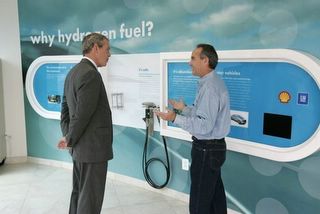Why hydrogen?
Er...maybe because the only way to efficiently produce hydrogen is by using fossil fuels? And that's good for the oil companies.
Here's Shell explaining it to monkey boy:
Why not hydrogen? Because, contrary to monkey boy's claims, it does nothing to decrease the United States' reliance on fossil fuels.
1) You'd lose less energy if you just burned fossil fuels, according to Culture Change:
Currently, most hydrogen is produced by the treatment of methane with steam, following the formula: CH4 (g) + H2O + e > 3H2(g) + CO(g). The CO(g) in this equation is carbon monoxide gas, which is a byproduct of the reaction.
Not entered into this formula is the energy required to produce the steam, which usually comes from the burning of fossil fuels.
For this reason, we do not escape the production of carbon dioxide and other greenhouse gases. We simply transfer the generation of this pollution to the hydrogen production plants. This procedure of hydrogen production also results in a severe energy loss. First we have the production of the feedstock methanol from natural gas or coal at a 32 percent to 44 percent net energy loss. Then the steam treatment process to procure the hydrogen will result in a further 35 percent energy loss.
It has often been pointed out that we have an inexhaustible supply of water from which to derive hydrogen. However, this reaction, 2H2O + e = 2H2(g) + O2(g), requires a substantial energy investment per unit of water (286kJ per mole). This energy investment is required by elementary principles of chemistry and can never be reduced.
2) Because more energy could be conserved by increasing vehicle mileage requirements, according to the National Resources Defense Council:
By 2030, when fuel cells could be more prevalent, oil savings from conventional and hybrid vehicle fuel-economy improvements are still five times as great as those from fuel cell vehicles.







0 Comments:
Post a Comment
<< Home